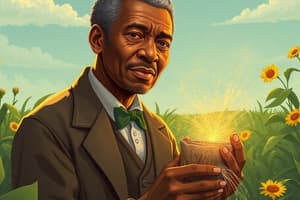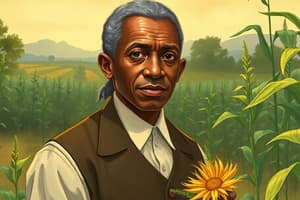Podcast
Questions and Answers
What was one of Carver's most iconic inventions?
What was one of Carver's most iconic inventions?
An inexpensive and practical milking machine for cows
How did Carver's work impact agriculture and industry?
How did Carver's work impact agriculture and industry?
His work helped diversify crops, increase agricultural productivity, and improve the lives of rural communities and farmers.
What recognition did Carver receive during his lifetime?
What recognition did Carver receive during his lifetime?
An honorary doctorate from Iowa State University and membership in the National Academy of Sciences
How does Carver's legacy continue to inspire scientists and innovators today?
How does Carver's legacy continue to inspire scientists and innovators today?
Signup and view all the answers
What message did Carver convey about nature and discovery?
What message did Carver convey about nature and discovery?
Signup and view all the answers
Study Notes
George Washington Carver: The Remarkable Agricultural Scientist and Inventor
George Washington Carver, born in the late 19th century, is a figure whose contributions to science, agriculture, and industry continue to inspire and educate. Often referred to as the "Peanut Man," Carver's legacy is deeply rooted in his achievements as an agricultural scientist and inventor, particularly in the realm of peanut research.
Life and Early Career
Carver was born into slavery in Missouri in 1861. Following the end of the Civil War, he was freed and eventually moved to Kansas and later to Iowa to live with relatives. In 1890, Carver enrolled at Iowa State Agricultural College (now Iowa State University), where he studied botany and agriculture. Upon graduation, he taught at the Tuskegee Institute in Alabama, where he served as director of the Agriculture and Applied Nutrition Department for more than 40 years.
Peanut Research
Carver's most notable work centered on peanuts, a crop he developed ingenious methods to cultivate and transform into various products. During one of his experiments, Carver discovered that peanuts could be used to produce a diverse array of products, from food items to industrial goods. His research led to more than 300 practical uses for peanuts, which included dyes, paints, plastics, cosmetics, medicines, and more.
Inventions and Innovations
Carver's passion for science and innovation extended beyond peanuts. He developed more than 100 products from other crops, including sweet potatoes, soybeans, and potatoes, transforming them into valuable resources for farmers and communities.
One of Carver's most iconic inventions was an inexpensive and practical milking machine for cows. The machine was made from common household items, such as a tin can, rubber, and wire, and was designed to help farmers milk their cows more efficiently.
Legacy and Impact
Carver's groundbreaking research and inventions had a profound impact on agriculture and industry. His work helped to diversify crops, increase agricultural productivity, and improve the lives of rural communities and their farmers. Carver received numerous awards and recognitions throughout his life, including an honorary doctorate from Iowa State University and membership in the National Academy of Sciences.
Carver's legacy continues to inspire scientists, inventors, and innovators today. As a beacon of perseverance and ingenuity, his work embodies the virtues of advancing human knowledge and solving complex problems through research and creativity.
In his own words, Carver once said, "I love to think of nature as an unlimited broadcasting station, through which God speaks to us every hour, if we will only tune in." This message, encapsulating Carver's reverence for the natural world and his passion for discovery, continues to resonate and inspire generations of scientists and inventors to come.
Studying That Suits You
Use AI to generate personalized quizzes and flashcards to suit your learning preferences.
Description
Explore the remarkable life and contributions of George Washington Carver, a renowned agricultural scientist and inventor. Learn about his pioneering work with peanuts and other crops, as well as his impact on agriculture and industry.





